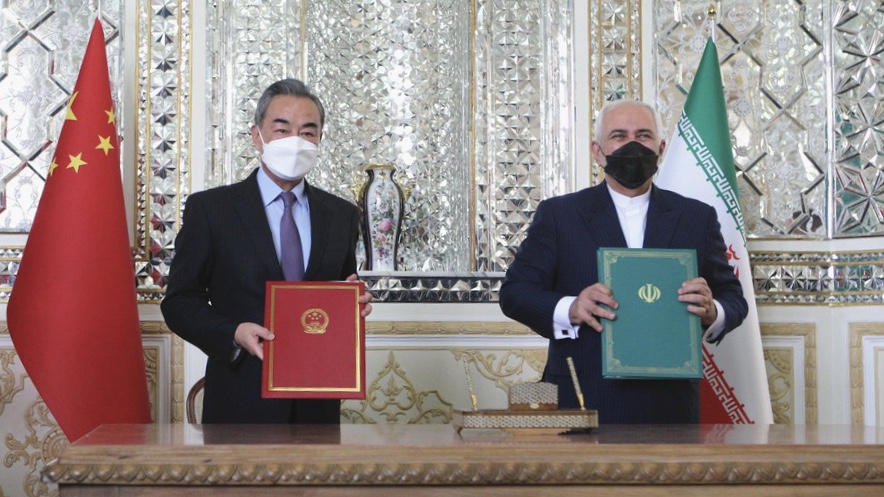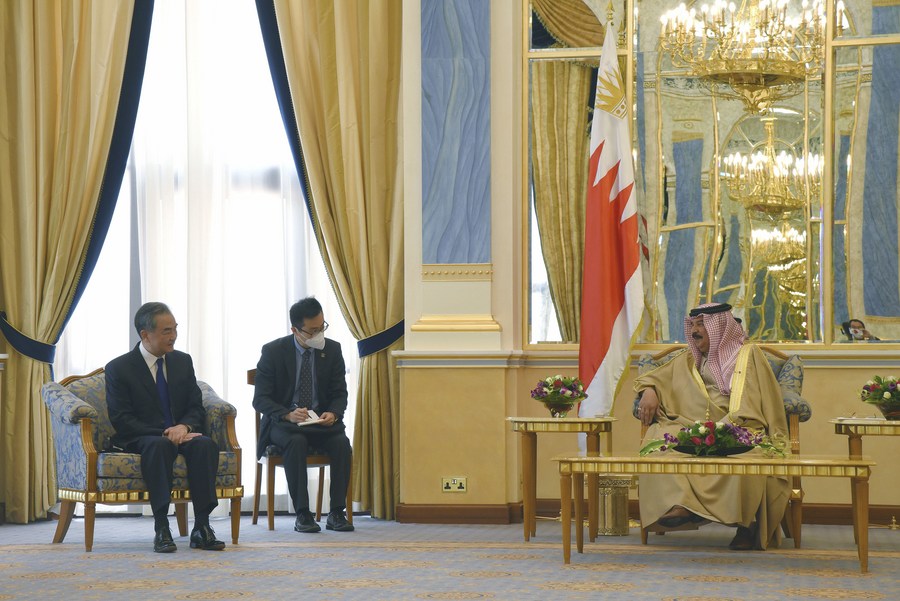
Visiting Chinese State Councilor and Foreign Minister Wang Yi (L) and Iranian Foreign Minister Mohammad Javad Zarif pose for photos with agreements on the China-Iran comprehensive cooperation plan in Tehran, Iran, March 27, 2021. /Xinhua
Visiting Chinese State Councilor and Foreign Minister Wang Yi (L) and Iranian Foreign Minister Mohammad Javad Zarif pose for photos with agreements on the China-Iran comprehensive cooperation plan in Tehran, Iran, March 27, 2021. /Xinhua
Editor's note: Djoomart Otorbaev is the former Prime Minister of the Kyrgyz Republic, Non-Resident Senior Fellow of Chongyang Institute for Financial Studies, Renmin University of China, and a member of Nizami Ganjavi International Center. The article reflects the author's views, and not necessarily those of CGTN.
On March 30, Chinese Foreign Minister Wang Yi concluded a week-long trip to nations in the Middle East. He visited Saudi Arabia, Turkey, the United Arab Emirates, Bahrain, Oman, and Iran.
China has long-established close trade relations with all countries in the region. There is not a single country where Beijing is not an important economic player. China is also a significant industrial partner for most countries.
For example, China is also active in Egypt, where their joint Suez zone of trade and economic cooperation operates. In the high-tech sector, Huawei recently signed a significant contract with Cairo.
Many expected China to present an updated economic plan that promised countries in the region additional investments in various sectors of the economy and infrastructure. And it's happening. What was new is that Beijing has put forward fresh and ambitious political ideas.
During the visit, China put forward a new initiative on the Middle East - five principles for resolving conflicts in the region. In more specific terms, Wang Yi made an unexpected offer of readiness to organize direct talks between Israel and Palestine and a security conference on the Persian Gulf.
For these purposes, Beijing is ready to provide its site. Besides, the Chinese minister also referred to the conflicts in Syria and Yemen, speaking of the country's willingness to resolve bloody disputes.
Among the most striking statements of the Chinese minister is his mention of the role of Western countries' policy, primarily the U.S., in the region. "We oppose imposing ideology on others and using human rights to interfere in other nation's affairs," Wang Yi said after his trip. It was noticeable that such statements appealed to China's Middle East partners, tired of Washington's ongoing pressure on those issues.
It is widely known that Muslim countries such as Saudi Arabia, Egypt, Qatar, the United Arab Emirates, and Oman do not comment on China's internal politics. The current tour of Wang Yi confirmed this status quo. "We firmly support the legitimate position of China on issues related to Xinjiang and Hong Kong; we oppose interference in the internal affairs of China," Crown Prince of Saudi Arabia Muhammad bin Salman Al Saud said at a meeting with the Chinese minister.
Among the most notable results of the trip was signing a 25-year cooperation agreement between China and Iran. Last year, some media outlets described areas of cooperation that could be included in the draft. These are nuclear power, port and rail infrastructure, the exchange of military technologies, investments in the Iranian oil and gas sector.

Bahrain's King Hamad bin Isa Al Khalifa (R) meets with visiting Chinese State Councilor and Foreign Minister Wang Yi (L) in Manama, Bahrain, March 29, 2021. /Xinhua
Bahrain's King Hamad bin Isa Al Khalifa (R) meets with visiting Chinese State Councilor and Foreign Minister Wang Yi (L) in Manama, Bahrain, March 29, 2021. /Xinhua
According to various sources, over the next 25 years, China will invest $400 billion in the Iranian economy. The interaction will allow China to strengthen its position as the leading partner of the Islamic Republic in trade, the volume of which, according to Tehran's official estimates, is now $18 billion a year.
For obvious reasons, cooperation in the oil and gas industry is beneficial to both parties. China will soon become the world's largest economy and therefore must have a stable supply of energy. The parties also agreed to create an Iranian Chinese bank. It will finance such supplies since, due to U.S. sanctions, Tehran has been cut off from the global financial system.
As a result, America now has fewer trump cards to keep putting pressure on the Islamic Republic. It will make the U.S. nervous because it looks like Iran will have a way out of the situation of economic strangulation.
It is also vital that having received political and financial support from China, Tehran will feel more confident dealing with the U.S. on lifting their sanctions. However, Beijing went even further, taking another decisive step. Wang Yi offered to host a security forum to help to re-establish a nuclear deal with Iran.
Another logical and substantial move of Chinese diplomacy was the fact that it invites Russia to this initiative. "Chinese officials have already traveled to Moscow to discuss with Iran and Russia a roadmap and timetable for the resumption of the nuclear deal with Iran," the minister said. This would be an essential achievement for both countries in resisting U.S. pressure, which, incidentally, brought them even closer to each other.
In Eurasian space, only those alliances that are required by the countries of the continent are going to remain stable. Being far from the continent and even with all their desire, no one will be able to impose their will on independent states.
This becomes even more unrealistic as the U.S. continues to lose its global credibility and influence. Further proof of this statement came from the successful visit of the Chinese minister to the Middle East.
Who knows, something that now seems impossible may take place in the near future. Probably not so soon, but perhaps China's step-by-step policy will help reduce tensions between Israel and Palestine, between Iran and the Sunni countries of the region such as Saudi Arabia and the UAE. The Middle East people have long-awaited peace and stability and will be grateful even for modest results leading to peace.
(If you want to contribute and have specific expertise, please contact us at opinions@cgtn.com.)

